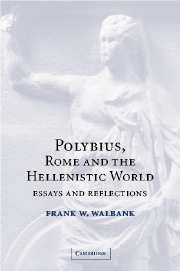Book contents
- Frontmatter
- Contents
- Preface
- Acknowledgements
- List of abbreviations
- 1 Polybian studies, c. 1975–2000
- HISTORICAL AND GEOGRAPHICAL PAPERS
- POLYBIUS AS A HISTORIAN
- 11 Timaeus' views on the past
- 12 Polybius and the past
- 13 The idea of decline in Polybius
- 14 Polybius' perception of the one and the many
- 15 Profit or amusement: some thoughts on the motives of Hellenistic historians
- POLYBIUS ON ROME
- TRANSMISSION OF POLYBIUS
- Bibliography
- Indexes
15 - Profit or amusement: some thoughts on the motives of Hellenistic historians
Published online by Cambridge University Press: 22 September 2009
- Frontmatter
- Contents
- Preface
- Acknowledgements
- List of abbreviations
- 1 Polybian studies, c. 1975–2000
- HISTORICAL AND GEOGRAPHICAL PAPERS
- POLYBIUS AS A HISTORIAN
- 11 Timaeus' views on the past
- 12 Polybius and the past
- 13 The idea of decline in Polybius
- 14 Polybius' perception of the one and the many
- 15 Profit or amusement: some thoughts on the motives of Hellenistic historians
- POLYBIUS ON ROME
- TRANSMISSION OF POLYBIUS
- Bibliography
- Indexes
Summary
There are two main obstacles when one tries to analyse the aims of Greek historians of the fourth to the second centuries bc: one is the failure of most of them to survive other than in fragments, the other is the fact that among those fragments it is only the rare passage that touches on purpose and method. The outstanding exception on both counts is of course Polybius: but, as I hope to show, he is not entirely representative. One of the themes that arise repeatedly in his work is the contrast between history for instruction and history for pleasure. In the brief space here available I want to take a look at this theme and ask what it can reveal about the general aims and practices of Polybius and his predecessors and contemporaries.
At the outset we should note that the antithesis use/pleasure is not one peculiar to history-writing. Many years ago Pohlenz demonstrated the existence of a theory of art, probably going back to the sophist Gorgias, which saw enjoyment, Ψυχαγωγία, as a means of improving the reader, the listener or the onlooker, both morally and intellectually. All arts shared this function, but especially poetry and tragedy. The general acceptance of this theory had been partially obscured by the fact that two of the most outstanding critics – Plato and Aristotle – either attacked the claim or ignored it. For Plato the content of poetry was untrue and could not therefore provide useful lessons.
- Type
- Chapter
- Information
- Polybius, Rome and the Hellenistic WorldEssays and Reflections, pp. 231 - 242Publisher: Cambridge University PressPrint publication year: 2002
- 1
- Cited by

